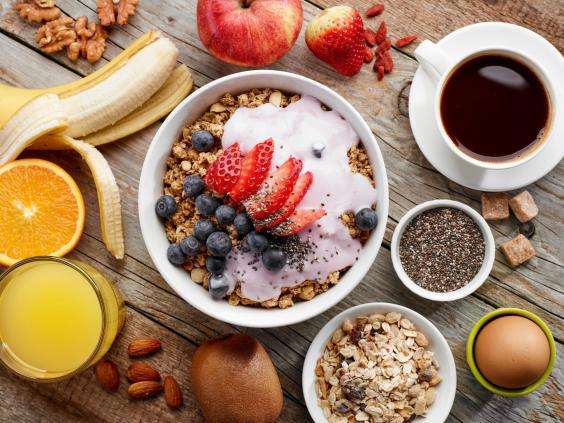'Clean eating is ugly, malevolent and damaging', says eating disorder specialist

An eating disorder specialist has spoken out against the “toxic” effects of the clean eating movement.
Dr. Max Pemberton has written an open letter for The Daily Mail revealing the worrying rise in young women who are developing eating disorders as a result of following restrictive and supposedly ‘healthier’ diets.
“For those of us who work in treating eating disorders, ‘clean eating’ — a trend that focuses on avoiding processed foods and consuming raw, unrefined produce — is a phrase we have come to dread,” he wrote.
He notes an “emaciated” 20 year old patient in her second year of university as typical of the women he sees. Like many others, her interest in wellness has perpetuated a demonisation of food groups, leaving her with a predominantly plant-based diet that is deficient in nutrients.
Pemberton explains that many of his female patients are unable to squat down or even walk up a flight of stairs because their body lacks sufficient energy and is subsequently eating its own muscles. In some cases, he notes, their condition is so severe that he refers them straight to emergency services, fearing that they are close to death.
Many of them will have also developed reproductive issues, whilst others will develop osteoporosis and fractures due to weak bones.
However, the damages Pemberton sees aren’t exclusively physical. Many will experience mental health conditions such as depression due to a lack of glucose in the blood. Not to mention endless shame cycle whereby patients will follow periods of clean eating by bingeing and subsequent vomiting.
In the worst cases he explains that repeated vomiting can cause the body to lose electrolytes which knocks circulation out of balance and can lead to heart attacks.
“At best, clean eating is nonsense dressed up as health advice. At worst, it is embraced by those with underlying psychological difficulties and used to justify an increasingly restrictive diet — with potentially life-threatening results,” he writes.
With figures from NHS Digital showing a rise in hospital admissions for eating disorders in England in the last five years, Pemberton believes the problem has been exacerbated by the rise of clean eating in celebrity culture.
He criticises stars like Ella Woodward and the Hemsley sisters for “peddling absolute quackery” without substantial scientific evidence.
Incidentally, Woodward, who shot to fame after she successfully treated Postural Tachycardia Syndrome through a plant-based diet, has since distanced herself from the movement.
"I am removing the word 'clean' from posts to ensure no relation to the new meaning of the word and what it has come to represent," Woodward wrote in a blog post earlier this year.
Similarly, when the Hemsleys appeared in BBC Horizon’s Clean Eating: The Dirty Truth, Jasmine, 36, said: “As with any trend there is always a backlash, which in a way is a good thing as it gets people talking about food. It is a media-coined term. We have never, ever used the phrase ‘clean eating’.”
Their desire to distance themselves is unsurprising given the substantial vitriol that’s been shot their way by various members of the media. Last year, former Great British Bake Off finalist Ruby Tandoh – who has personally suffered from eating disorders in the past - wrote a scathing article for Vice, condemning wellness gurus such as Woodward, the Hemsleys, Madeleine Shaw and Tess Ward for promoting restrictive, unhealthy diets without significant research.
Whilst the rules of clean eating are far from clear cut, the underlying commonality is the omission of certain food groups – whether it’s gluten, dairy, grains or meat.
These diets “fail to deliver”, claims Pemberton, “because any diet based on denying entire food groups will always fail — and the whole circus moves on to the next fad”.
“Long before ‘clean eating’ came on the scene," he continues, “doctors like me would see some patients with eating disorders who would describe an obsession with trying to eat healthily. The difference now is that the whole clean eating movement gives them a veneer of respectability. This means they can easily justify their behaviour not just to themselves, but also their families.”
Pemberton also fails to believe that anyone subscribing to clean eating doesn’t suffer from some form of eating disorder, arguing that the lifestyle is synonymous with orthorexia – a term coined to describe a fixation on eating healthy foods.
Ultimately, it comes down to a matter of terminology, he explains, pointing out that the idea of seeing certain foods as clean and subsequently others as dirty, is an “inherently disordered way of viewing the world”.
Article Source: http://www.independent.co.uk/life-style/food-and-drink/clean-eating-disorders-ugly-damaging-health-diet-food-pemberton-ella-woodward-a7848381.html
Image Source: https://static.independent.co.uk/s3fs-public/styles/story_medium/public/thumbnails/image/2017/07/19/10/istock-515437626.jpg
VOCABULARY WORDS:
1. Malevolent (adj.) ~ having or showing a wish to do evil to others
2. Emaciated (adj.) ~ abnormally thin or weak, especially because of illness or a lack of food
3. Underlying (adj.) ~ being the cause or basis of (something)
4. Scathing (adj.) ~ witheringly scornful severely critical
5. Exacerbate (v.) ~ make (a problem, bad situation, or negative feeling) worse
6. Backlash (n.) ~ a strong and adverse reaction by a large number of people, especially to a social or political development
7. Vitriol (n.) ~ cruel and bitter criticism
8. Fad (n.) ~ an intense and widely shared enthusiasm for something, especially one that is short-lived and without basis in the object's qualities a craze
9. Perpetuate (v.) ~ make (something, typically an undesirable situation or an unfounded belief) continue indefinitely
10. Peddle (v./ derogatory) ~ promote (an idea or view) persistently or widely
QUESTIONS FOR DISCUSSION:
1. What is 'clean eating'?
2. What do you think are the factors that contribute to the popularity of these fads?
3. According to the article, what are the possible negative impacts of these fads to the health of people?
4. Have you ever tried any kind of popular diet trend? If yes, was it effective? If no, would you like to try any of them? Explain your answer.